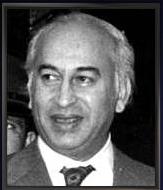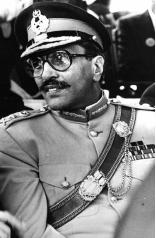|
|
|
Coup 1977 and Assassination Of Mr. Zulfikar Ali Bhutto

General Elections were held on March 7, 1977. PPP was the victorious Party. At the support and directions form General Zia ul Haq(the man, Mr. Bhutto had appointed Chief of Staff of the Army staff) & some foreign powers, PNA accused government of so-called rigging in the elections. PNA created a great disturbance in the country and and denied to accept election results.
Negotiations between Mr. Bhutto and PNA resumed. An Agreement was reached on June 8, 1977 for holding Fresh Elections on October 8, 1977. Some of PNA leaders did not accept the agreement and presented additional ten points for final agreement. Asghar Khan (PNA leader) wrote a letter to army chief, asked him to over throw the Bhutto government. On 4th July Mr. Bhutto announced that he would signed the agreement on 5th of July.
But the conspirators joined hands with Gen. Zia at the behest of foreign powers who feared Bhutto's capacity of uniting the Third World countries and sought to punish him for developing Pakistan's nuclear capacity.Acting on pre-planned conspiracy Gen. Zia imposed Martial Law upon the country on 5th July, 1977. One of PNA negotiator professor Ghafoor has written a book "Phir Marshal Law Aa Gia",In his book he wrote the story of negotiation betweem PNA and Mr. Bhutto. At the end of the Book he stated that if this step was not taken on 4th July then probably 5th July, might be the the date of final agreement. The Army, headed by the Chief of Staff, General Mohammad Zia ul Haq,
carried out a coup in Rawalpindi in the early hours of July 5, arresting Mr Zulfikar Ali Bhutto, several members of his Government and all the most prominent PNA leaders except Begum Wali Khan.The arrested political leaders were taken to the hill station of Murree, but the Pir of Pagaro and Mian Tufail Mohammad, who were among them, were quickly released.
The Army, headed by the Chief of Staff, General Mohammad Zia ul Haq,
carried out a coup in Rawalpindi in the early hours of July 5, arresting Mr Zulfikar Ali Bhutto, several members of his Government and all the most prominent PNA leaders except Begum Wali Khan.The arrested political leaders were taken to the hill station of Murree, but the Pir of Pagaro and Mian Tufail Mohammad, who were among them, were quickly released.
In a broadcast that evening General Zia announced that the National and Provincial Assemblies had been dissolved, that the national and provincial Governments and the provincial governors had been removed, and that martial law had been imposed throughout the country. In his broadcast he promised to hold new elections within 3 months,(This was the first of many promises Zia did not keep)
"My sole aim," General Zia declared, "is to organize free and fair elections, which will be held in October. Soon after the pulls power will be transferred to the elected representatives of the people."I give a solemn assurance that I will not deviate from this schedule."To allow emotions to cool off, all political activities had been banned, hut they would be allowed before the elections.
Martial law regulations promulgated on July 10 banned all political and trade union activities;
Zia's Military Junta established a government of PNA with CMLA as President. Zulfikar Ali Bhutto arrested on July, 5, 1977 and released on July 28, 1977. Re-arrested on September 3, 1977 from Clifton, Karachi, on the charges of a fabricated murder case; again released on September 13, 1977 against Lahore High Court bail. Re-arrested at Larkana on September 17, 1977.
General Zia told a press conference on July 14 that the Army's aim was to hold free and fair elections within 90 days, and they did not want to remain in power even for a single day after the elections. They had intervened because both sides had been armed to the teeth, and if they had not done so there would have been civil war. The military council, he stated, would not take steps against any political leader, as if this were necessary it should be done by the next elected Government.On September, 1977 the Chief Justice of Pakistan, Mr. Justice Yakub Ali Khan was suspended from service by Gen. Zia because he had admitted Mrs. Nusrat Bhutto's Petition challenging imposition of martial law.
However, after it became clear that Bhutto's popularity had survived his government, Zia postponed the elections and began criminal investigations of the senior PPP leadership. Fearful of a PPP victory Gen. Zia arrested Mr. Bhutto in a fabricated murder case.
Gen. Zia ul Haq, some PNA's leaders, conspirators and some foreign powers knew that it was impossible to finish Mr. Zulfikar Ali Bhutto politicaly, So they decided to finished Mr. Bhutto physically. As a result Gen. Zia oppinted Maulvi Mushtaq, as a Chief Justice of Lahore High Court, who was a known critic of the PPP & Mr. Bhutto. Maulvi Mushtaq cancelled the bail already granted to Zulfikar Ali Bhutto by LHC. Conspirators started acting on pre-planned agenda to remove Mr. Zulfiqar Ali Bhutto physically under the supervision of Gen. Zia.Subsequently, Mr. Zulfikar Ali Bhutto was sentenced to death in fabricated murder case.
Mr Bhutto, who made a personal statement, insisted that the case against him had been fabricated, and that he was the victim of a conspiracy. He accused the Lahore High Court of having been biased against him from the beginning.

Strict security precautions were taken after the announcement of the court's judgment. All schools and universities were closed indefinitely, guards were posted around public buildings, railways, irrigation canals, telephone exchanges and power stations were also guarded to prevent the people to protest against sentence. Gen. Zia also established a military courts in order to crush & punish his opponents espacially Bhutto's supporters. Thousands of workers, peasants, youth, students and political workers were tortured, lashed, imprisoned and hanged in the jails of the military rule.
The whole affair mounted to eliminate physically the country's most popular national leader, for his enemies knew that they cannot eliminate him politically or by elections.
Ex-President Chaudhry Fazal Elahi visited Rawalpindi on Feb.11 to plead with President Zia for his life, but was refused an interview. He there upon delivered a letter for the President, in which he said: "Implementation of the death sentence is a matter of grave concern not only for Pakistan, but for the international community as well. Nationally it threatens the independence, integrity and sovereignty of the motherland, and internationally it is bound to aggravate, beyond the point of no return, instability in an area of extreme strategic importance to the economy and politics of the whole world." He emphasized that the fact that three judges had acquitted Mr Bhutto must raise grave misgivings, and referred to the "unfortunate coincidence" that the four judges who had found against him all came from the Punjab whilst the three who had found in his favour all came from the other provinces. Press and radio reports of the letter were banned by the military regime, but it was broadcast by the BBC's Urdu-language service.President Zia said in an interview released on Feb.18 that when deciding Mr Bhutto's fate he would consult both the Military Council (consisting of the Chiefs of Staff of the three services) and the Cabinet, and would accept their decision. On March 1, however, he denied that he had ever said this (although the text of the interview had been released by the Government)
Lt.-Gen. Tikka Khan, the former Army Chief of Staff and Defence Minister, who had been under house arrest since March 1978, also wrote to President Zia on Feb.21, appealing to him to commute the sentence "to avoid putting the loyalty of the armed forces to the test", and warning him that hanging Mr Bhutto could lead to the disintegration of Pakistan.
Appeals for clemency were sent to Gen.Zia in February by many world leaders, including Pope John Paul II, Dr Kurt Waldheim, the UN Secretary-General, President Carter of the USA, President Brezhnev of the Soviet Union, President Giscard d'Estaing of France, King Juan Carlos of Spain, President Tito of Yugoslavia, Chairman Hua Guofeng, the Chinese Prime Minister, and the Prime Ministers of the United Kingdom, West Germany, Denmark, Norway, Sweden and Vietnam.The Governments of most of the Arab countries, including Saudi Arabia, Kuwait, Qatar, Oman, the United Arab Emirates, Egypt, Iraq, Syria, Jordan, Libya, Sudan, Somalia, Algeria and Morocco, asked Gen. Zia to commute the death sentence.
A letter from King Khaled of Saudi Arabia was handed to Gen. Zia by the Saudi ambassador on Feb.22. A high-level Pakistani delegation, including Mr Agha Shahi and Mr Ghulam Ishaq Khan, subsequently flew to Riyadh on March 2 for talks with King Khaled, and reported to an emergency cabinet meeting immediately after their return two days later. However, a report that President Zia had given a "categorical assurance" that Mr Bhutto would not be hanged (put out on March 20 by the official Saudi News Agency and broadcast by the Saudi Radio) was denied by Pakistani Government sources.Dr Waldheim sent another message to Gen. Zia on March 27 recalling the appeals sent by many world leaders and expressing the hope that "this universal appeal to spare the life of Mr Bhutto will be heeded".
Despite international appeals on his behalf, Bhutto was hanged on April 4, 1979. The execution was carried out in strict secrecy. His body was taken to his ancestral village, Garhi Khuda Bakhsh, Larkana, where he was buried under strict army supervision.
His wife and daughter, who were under house arrest, were not allowed to attend the funeral.Gen. Zia had said in a television interview on April 2 "I won't reprieve him, not yet", and government spokesmen had assured foreign correspondents on the following day that the President had not formally rejected the plea for clemency and denied that the execution was imminent. Mr Bhutto was not allowed the customary 48 hours between rejection of the petition and execution, and the sentence was carried out 2½ hours before the time provided for by prison regulations. No public announcement of the execution was made until nine hours later; after Mr Bhutto had already been buried.
Zia assumed the Presidency and called for elections in November. However, fearful of a PPP victory, Zia banned political activities & political parties in October 1979 and postponed national elections. Martial Law regulation 49 imposes pre-censorship on the press and allows journalists violating the rules to be fined, imprisoned or flogged. Newspaper declarations cancelled for offending Zia regime: Masawat, Sadaqat, Qasid, Etemad.